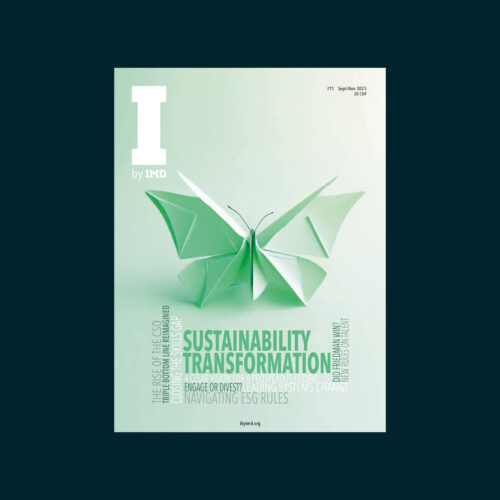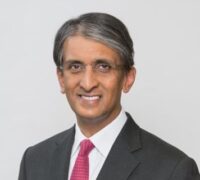Focusing on the facts to tailor a new future for fashion
PVH’s Stefan Larsson on his approach to rebuilding the apparel business, sustainably...
YouTube
September 19, 2023 in CEO Dialogue Series
Dilhan Pillay, CEO of Singapore’s global investment giant Temasek, discusses with Jean-François Manzoni the importance of a carbon tax and how his company is working to ensure ‘every generation prospers’ without sacrificing...
The year 2022 was a turbulent one for financial markets, with rampant inflation and the resulting rate hikes by central bankers leading to the worst stock market performance since the 2008 global financial crisis.
Against this volatile backdrop, Temasek, a global investment company, is doubling down on its mission to build a resilient and forward-looking portfolio with sustainability at its core.
Founded in 1974 to own and manage businesses and assets previously held by the Singaporean government following the city-state’s independence from Malaysia, Temasek has grown from a portfolio of 35 Singapore-based companies with a book value of 354 million Singapore dollars ($261m) to a global investment house worth 382 billion Singapore dollars (as of 31 March 2023).
Ranked among the top 10 investors in the world (according to the Global SWF 2022 GSR scorecard), with average annual returns of 14% since 1974, 6% over the past decade, and 9% over the past 20 years, Temasek owns holdings as diverse as China’s second-largest lender China Construction Bank, German pharmaceutical group Bayer, and Singapore Airlines, and employs 950 people globally.
If you look at all the events that would impact the portfolio over that timeframe (15 to 20 years), you cannot ignore the impact of climate change.- Dilhan Pillay
Dilhan Pillay joined Temasek in 2010 from the law firm WongPartnership with a plan to stay for three years. Thirteen years later he’s still there – not because he was promised a job, but because he became increasingly convinced that pursuing Temasek’s mission to secure prosperity for future generations was more important than what he had left behind.
In October 2021, he ascended to the CEO role just as the investment firm grappled with the economic fallout from the pandemic and rising global trade tensions. Yet this has only emboldened Pillay to double down on Temasek’s mission to help its portfolio companies transition towards a net zero future.
Even before taking over Temasek’s helm, Pillay was involved in shaping the investment firm’s 2030 strategy that identified six key issues that pose current and future challenges and opportunities, among them persistent inflation, geopolitical tensions, and climate change.
This strategy is supported by four pillars, one of which involves putting sustainability at the core. It aims to slash the net carbon emissions of its portfolio to half of 2010 levels by 2030 and achieve net zero portfolio emissions by 2050.
While this is undoubtedly the right thing to do for future generations who will have to deal with the “existential problem” of climate change, Pillay champions the approach and believes it makes good financial sense.
“If you’re a long-term investor, you look at what the value of the portfolio is going to be, not in terms of a three, five, or 10-year timeframe, but even 15 to 20 years,” he said. “And if you look at all the events that would impact the portfolio over that timeframe, you cannot ignore the impact of climate change.”
It’s not just about making financial returns – which are very important – but it’s also about how we uplift communities.- Dilhan Pillay
Pillay admits that reaching some of Temasek’s goals will be a tall order for some of its investments, which include a container shipping company, an airline, and a port business. But he believes setting out a clear and credible vision for how to get there will be rewarded by investors.
“It’s not like a light switch that’s on or off, it’s a journey. But you have to start somewhere,” he said. “You come up with a plan for that journey, figure out how you’re going to transition your business, transform your business, when you’re going to put capital to work for that transformation, and start doing it now because then the long-term value will be ascribed to you by other investors and we will get the benefit too.”
He cites the example of Sembcorp Industries, a power utilities company that hived off its division that developed offshore oil rigs in 2020, to focus on green energy. The new CEO committed to quadrupling its renewables capacity to 10 gigawatts by 2025 – a target he had almost hit by the end of 2022 – and generating 70% of its profit from green investments in the same period.

No organization can escape the need to transform to become more sustainable. The need to act is urgent. It calls for strong leadership, difficult decisions, and deep cultural change. In Issue XI, we explore how to build sustainable organizations to succeed in turbulent times.
“The share price has gone up three-and-a-half times. Not because of us – we haven’t bought a single share – but because a new group of investors have embraced that transitional model and is now basically valuing him on his execution capabilities of the vision he has set forward for the company,” explained Pillay.
Temasek has taken some bold action to ensure its portfolio is fit for the future, including imposing an internal carbon price of US$50 per tonne of CO2 to better assess the resiliency of companies in their transition journeys, and prepare for a world in which regulators might force firms to price in the cost of their actions.
The firm expects to raise its internal carbon price progressively to $100 per tonne of CO2 by the end of the decade. One of its existing portfolio companies, the national carrier Singapore Airlines, is in the process of renewing its entire fleet with planes that are up to 30% more fuel efficient. “Now why is that important? Well, because Singapore Airlines emitted 19.6 million tonnes of CO2 equivalent back in 2019, pre-pandemic. And if they go up at that level to $100 per tonne [of CO2 emitted], you’re going to be looking at a bill of almost $2 billion,” said Pillay. “That’s not feasible. So, you’ve got to do things today to reduce that full impact in the future.”
The internal carbon price also acts as an incentive to invest in carbon-negative businesses, which could include sequestration, green hydrogen, and carbon capture and storage. This fits with Temasek’s broader purpose – simplified in 2021 into the statement, “So every generation prospers” – which encapsulates its role as stewarding today’s assets for the benefit of current generations as well as those who have not yet been born.
“I believe that we are here to ensure that future generations benefit from what we do today. At the end of the day, it’s not just about making financial returns – which are very important – but it’s also about how we uplift communities,” he said. “We have a responsibility, with others, to create a better world for future generations.”
Watch the full CEO Dialogue to hear more about Temasek’s evolving investment strategy, his view on China’s economic prospects, and how the investment firm has built centers of excellence in AI, blockchain, cyber, and digital transformation to add value to its portfolio companies.

Executive Director & CEO of Temasek
Joined Temasek in 2010, and held various leadership roles before becoming CEO, including Head of Temasek's Investment, Portfolio Management, and Enterprise Development Groups. He has also led various market teams including Singapore, and the Americas.

IMD President
Jean-François Manzoni is the President of IMD, where he also serves as the Nestlé Professor. His research, teaching, and consulting activities are focused on leadership, the development of high-performance organizations and corporate governance.
September 28, 2021 in CEO Dialogue Series • 7 min read
PVH’s Stefan Larsson on his approach to rebuilding the apparel business, sustainably...
September 7, 2021 in CEO Dialogue Series • 5 min read
Klaus Schwab discusses the urgent need for stakeholders to collaborate to combat the climate emergency, cope with technological change and address skills gaps in an interview with Jean-François Manzoni, President of IMD...
August 2, 2021 in CEO Dialogue Series • 8 min read
Pascal Soriot says "climate change is the biggest threat to humanity” and discusses future-looking strategy with Alexion acquisition in exclusive interview on company’s turnaround....
July 6, 2021 in CEO Dialogue Series • 6 min read
Mark Schneider cites data suggesting that effects of climate change and biodiversity loss have shot to the top of the agenda....
June 3, 2021 in CEO Dialogue Series • 9 min read
Alexis Nasard extols the virtues of inclusive capitalism to create a society where everyone is a winner. Interview by Jean-François Manzoni ....
April 27, 2021 in CEO Dialogue Series • 6 min read
The former CEO of IT company Infotheek Group shares his secrets for successful M&A integration, picking the right bets, and saving time on emails....
March 23, 2021 in CEO Dialogue Series • 3 min read
LEGO Brand Group Executive Chairman says its strong performance during global lockdown this year was built on a deep-rooted culture of resilience and agility....
March 23, 2021 in CEO Dialogue Series • 1 min read
In an interview with IMD President Jean-François Manzoni, the head of Belgian chemicals multinational Solvay talks about how coronavirus could galvanize a much-needed international response to global warming...
August 12, 2020 in CEO Dialogue Series • 4 min read
The leader of the world’s largest container shipping group predicts that trade will recover quickly to pre-pandemic levels and grow slowly but steadily thereafter....
Explore first person business intelligence from top minds curated for a global executive audience